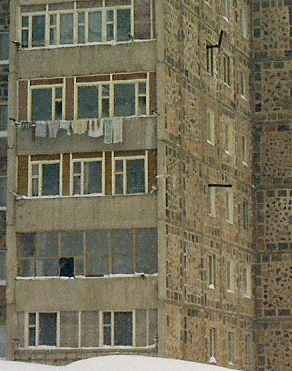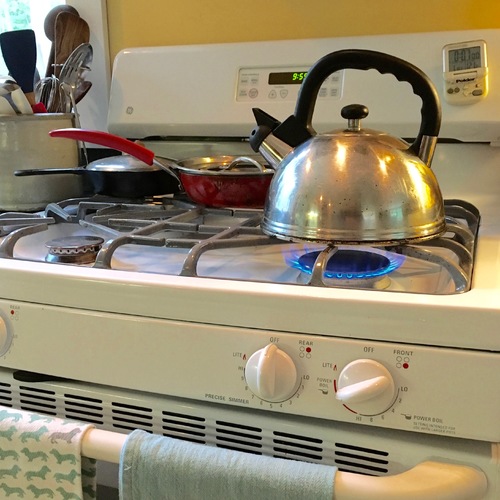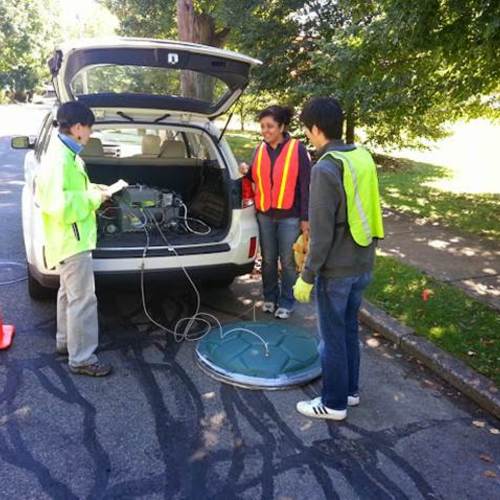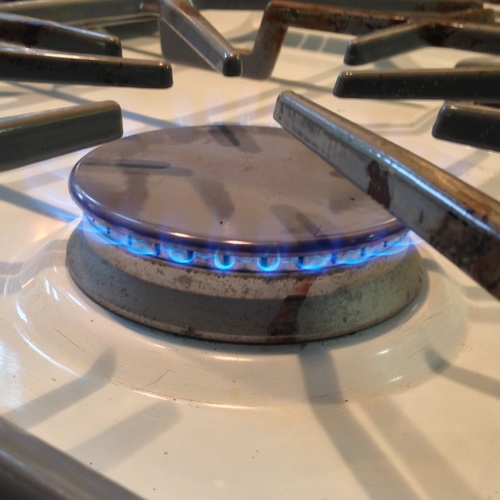
Image Credit: All photos: Martin Holladay
In the wake of the recent military crisis in Crimea, energy experts have been discussing whether Vladimir Putin will be tempted to gain political advantage by shutting the valves on the Russian natural gas pipelines that supply Ukraine and Western Europe. Regardless of whether this scenario is likely, such speculation raises the question: How would urban residents in a cold climate cope if the supply of natural gas were suddenly turned off?
Hollywood screenwriters have imagined various dystopic versions of a future economic collapse; these fictional accounts usually involve desperate citizens fighting over firewood and scraps of food. Most of these stories feature roving bands of armed, violent thugs. Unlike these screenwriters, however, I don’t believe that an energy crisis or economic collapse would necessarily lead to social anarchy.
Week-long electricity blackouts cause massive problems
Of course, many Americans have some familiarity with the consequences of short-term energy crises. We know what usually happens during electricity outages (for example, after an ice storm or a hurricane), and many of us remember the consequences of tight oil supplies during the 1970s.
During a blackout, many homes have no running water, no refrigeration, no air conditioning, and no heat; it can become quite unpleasant to live in such a home after just a few days without electricity. To limit suffering, authorities usually respond to these disasters by establishing emergency shelters, setting up gasoline-powered generators in public buildings, and distributing fresh drinking water.
In the U.S., these energy crises are usually solved in a matter of days or weeks. But what would happen to urban society if energy supplies were cut off for months or years?
The Armenian energy crisis of 1992
I lived and worked in Armenia for 18 months, off and on, between April 1990 and March 1992. I started…
Weekly Newsletter
Get building science and energy efficiency advice, plus special offers, in your inbox.

This article is only available to GBA Prime Members
Sign up for a free trial and get instant access to this article as well as GBA’s complete library of premium articles and construction details.
Start Free TrialAlready a member? Log in















16 Comments
people in need
A really interesting story with a moral that I really hope applies to this country, if it comes to that. And I think it does. For all their posturing, my Tea Party friends are some of the nicest people you'd ever want to meet; they'd give you the shirt off their back if you're in need. However, if you're one of those Other People in someplace far away, not so much.
Speaking of people in need (Syria), did you see this horrifying UN photo of refugees in Syria?
Thanks Martin.
1990, '91? I remember it well. The picture you paint seems other worldly by comparison. Spooky, really. Not hard for me to imagine many other places around the globe in similar situations in the years since, while I stress about the price of gas or how my IRA is doing or where my kids are going to college.
Thanks for the reality check.
a wake up call
Martin … very moving and provoking with great photos. That must have been a highlight experience in your life. Thank you.
Natural gas prices in Ontario, Canada were approved for a 40% hike yesterday.
Vents-US, the first company to really explore and market what looks like a commercially viable single room, small, cost effective HRV/ERV is a Ukrainian company.
http://www.ventilation-system.com/images/cat/619_1503_cat_file_lang.pdf
Uncertainties of culture...
Martin,
Interesting story, thanks for sharing.
I hope that your hopeful outlook proves itself over and over again in time.
Seems like a large unknown in this regard is culture.
Western culture, for example, has for so long cultivated very individualistic definitions of status and success...
I wonder how easily those cultural ideals are put aside when the environment changes from a state of relative plenty to a state of relative scarcity.
It is rational to realize that community is more resilient than the individual but I'm not sure rationality is a universal human response to "hard times"...
And where the benefits of community are realized, it can be a fine line beetween "community" in a constructive sense and "community" in a more tribal and destructive sense.
Certainly it would seem that there are now many people living in this world whose life experience has been almost completely devorced from the more ecological and primitive realities of life that can be imposed by "hard times".
relevance to the US
Outside of this community, I think that most people's reaction to this article would be something along the lines of "A great story but that could never happen here". How do you respond when you're confronted with that?
Great story.
I'm sharing this on FB with some of my Turkish contacts. Their government, of course, was partly responsible for the blockade.
Response to Brent Eubanks
Brent,
You suggested that many people might react to this story by saying, "A great story but that could never happen here." You didn't specify where you meant by "here," but I'm going to guess that you meant the United States.
It's possible that people who have lived a privileged life in the U.S. will react as you have suggested. But there are many types of Americans.
In addition to my Armenian-American friends, some of my friends are old hippies who have been growing their own food and making their own electricity for decades. Some of my friends remember the Great Depression, or the stories of their parents who knew hard times in the 1930s. Some of my friends are the children of Holocaust survivors. I have friends who emigrated from Vietnam on a leaky, overcrowded boat, and who were boarded by pirates and abandoned to drift for weeks until they reached Indonesia. All of these people are Americans, and many of them know that access to food and energy are not guaranteed.
Thanks for sharing
I really appreciate hearing about these first-person experiences, Martin. Providing an international perspective helps us consider vulnerabilities here at home. We have been very fortunate that some of our extended power outages in the Northeast haven't occurred during the coldest or hottest times of year. This is one reason we need to be creating buildings with much better insulated envelopes — to maintain habitable temperatures in the event of interruptions in heating fuel or power outages.
Through the Resilient Design Institute, I've also begun focusing on the all-important social aspects of resilience. How do we design our communities and buildings to foster social interaction so that people — especially in urban communities — get to know their neighbors and can provide support during times of stress?
Great human interest story!
Thanks Martin!
The wealthy folks living in the east after Sandy, had no clue as most just moved to their "other houses" away from the shore. The less fortunate of course suffered. I certainly wouldn't mind if Hollywood disappeared in an earthquake. For those of us smart enough, our passive houses with solar and/or wind will stand the test of time. The little extra $s spent on building go a long way to comfort us. As a 30 year climbing guide, I spent my time in mud huts and tents in less fortunate countries and all those folks were happy with less. Thanks again for helping those in need.
Thank you.
Martin,
Thank you for sharing and am so impressed that TPI would give you the license to speak so frankly. Living in Toronto, we are both privileged and unaware of what "could" happen. Though I hope this never happens here, it certainly happens "elsewhere" to "others." I certainly hope the picture of co-operation would emerge. Best to invest in community and good social bonds...
More prescient, Russia holds a lot of clout on the supply of natural gas and yellow cake for nuclear reactors - which may reduce the west to mere sabre rattling as the Ukraine shivers.
We've had a hint of it here
Within the last month or so, natural gas supplies in parts of Wisconsin were restricted for a few days and residential customers were requested to set their thermostats at 60 degrees, and some major industrial gas users shut down temporarily. This was only for a few days, but it was fairly cold out (this has been a very cold winter), and I would hope it made people think a bit--but I have my doubts. We have wood heat, a well -insulated older farmhouse, and PV and wind generated electricity with batteries, so it didn't affect us directly. A son who lives in town in a renovated older home really appreciated the re-insulation and air sealing they had done a few years ago after getting a energy audit that included a blower door test. His example really brought home what difference energy efficient housing could make.
Thank you
Martin,
Thank you for your insight, for the story, and for the pictures.
This is, in my opinion, one of the most interesting (as a "what-if" development) and one of the most concerning (from a “what-if” perspective) topics for discussion that you have posted here. A bit off the usual topics perhaps, but a very potentially meaningful topic as we look to the future.
You mention early on in your blog that we consider the idea of a blackout or other disruption of energy production that doesn’t just last days or weeks but one that lasts months or even years.
As you also mention, there has been at least some interest in Hollywood in presenting dystopian drama directly related to such a doom’s-day scenario ranging from the not-quite-horrible-with-a-few-good-ideas National Geographic Channel special presentation “American Blackout”, to the absolutely and painfully unwatchable TV series “Revolution”.
Shows such as Doomsday Preppers offer an interesting mix between the almost stereotypical urban gorilla planning for “bug-out” day in his (or her) urban assault vehicle armed to the teeth to take on the hordes of frightened and hungry people that stand in the way of his (or her) true utopia, all the way to organic farmers, both country and city, with a sustainable food supply ranging from simple raised bed gardens to fully enclosed and functional aquaculture tanks with electrical needs supplied using renewable power.
As much as we American’s like to think of ourselves as independent, rugged individualists, I would suggest that perhaps we are in many ways the most dependent society in the history of the world. Not just government dependent, but clock dependent, cell phone dependent, microwave dependent, grocery store dependent, technology dependent, CONVENIENCE dependent.
Need a drink of water? Turn on the tap. Wait, sorry, change that to - open the plastic, disposable bottle in the refrigerator and drink the water that was bottled, stored, shipped a couple hundred miles, and sold in a store at a 1000% mark-up (the bottle cap cost more than the water did).
We don’t just anticipate help when we have an emergency, we expect it. Heck, we demand it as a right of citizenship; and if it doesn’t come to us fast enough then we demand an accounting as to why not – we ask WHO was responsible? WHO was to blame for my discomfort? Because it certainly wasn’t MY fault that I didn’t have enough food, or water, or toilet paper to tide me over when things fell off the “normal” wagon.
I think that your Armenian experience is telling. While I am not an expert by any means, I would suspect that “middle class standards” in late 1980’s Armenia were more akin to the US of the late 1940’s / early 1950’s timeframe than equivalent to the USA of the time? I also suspect that the people of Armenia pretty much knew that they weren’t going to be seeing convoys of National Guard troops coming to the rescue when things got rough. Perhaps also more akin to American’s in the 40’s and 50’s than American’s of the time. They were self-reliant. They knew how to survive without help. Not that they didn’t welcome help, but they understood that it was to assist their self-reliance, not to replace it.
What if things really went bad? What if the sun hiccupped and we were to experience the big brother of the 1859 Carrington Event? What if a nation that wasn’t overly friendly with us decided to test EMP theory on us (Both Iran and North Korea (and probably China, Russia, USA and every other nuclear-capable country) consider the development of a “super EMP” warhead as part of their “defense” arsenal. Iran and North Korea write openly of a super EMP weapon as an "equalizer" when dealing with larger more powerful countries and both have commented openly about the vulnerabilty of a technologically depenent foe). What if someone unfriendly towards us was to engineer a real version of Y2K? What if ?
I agree 100% that knowing your neighbors; that cooperating with friends and neighbors; that having a sufficient store of food and knowing how to grow more on your own; that having an available source of fresh water; that generating your own power, even if it’s just w wood stove that will keep you warm and alive in the cold. I understand that these are skills that we all need and that so many lack - or even realize that they do lack even basic coping skills. Why bother? If something happens the government will be there for us and they better be there quick because I vote!
So what happens if the government doesn't show up to rescue?
I am very much in agreement that self-reliance and cooperation is the best possible scenario, and frankly I am not really concerned about the prepper with his or her bug-out wagon and loads of guns and ammo, it’s the other 300,000,000 people that concern me.
Regards,
Valuable story
Thank you for telling a story that we seldom hear in America. I keep thinking about the many millions of people in other parts of the world, and have only a glimmer of understanding how they live. But nearly all I hear reminds me I am lucky to have been born "here" (many different places are "here" for many different readers).
Thanks for your good work.
As a friend by convincement, I very much respect and value your service to the AFSC. Many thanks.
Differences
I cannot help but wonder if this is a realistic prediction of how the US would react in a similar situations. Post-Katrina New Orleans, for example, had a lot more looting and violence than you describe Yerevan as having. Thoughts as to what the causes of these differences are?
Response to Noah Manning
Noah,
First of all, it's important to separate reports of post-Katrina looting from historical fact. As journalists and historians now realize, many looting reports were false or exaggerated. For example, the Wikipedia article on the "Effects of Hurricane Katrina in New Orleans" notes, "The aftermath of Hurricane Katrina was characterized by extensive reporting of looting, violence, shooting against rescuers, murder and rape. While some criminal acts did occur, such as the emptying of an entire Wal Mart, many reports were also exaggerated, inflated, or simply fabricated. Several news organizations went on to issue retractions. There were reports of snipers taking potshots at rescue helicopters; these were false. Reports of gangs roving the city shooting police officers and survivors were also false, as only one policeman was shot in the aftermath of Katrina and no indictments were brought forward against the supposed gang members. In many cases, what was called 'looting' could be alternatively defined as 'appropriation of essential supplies by survivors who had received no assistance from the government.' In addition, several instances of actual looting were later found out to have been carried out by NOPD officers. The media reports did fuel a paranoid anxiety in many homeowners who decided to take up arms to defend their property. Investigations carried out in the years following the hurricane turned out evidence of violence by white vigilante groups against evacuees and survivors, usually young black men."
Similarly, a New York Times article, "Rumor to Fact in Tales of Post-Katrina Violence," "The narrative of those early, chaotic days — built largely on rumors and half-baked anecdotes — quickly hardened into a kind of ugly consensus: poor blacks and looters were murdering innocents and terrorizing whoever crossed their path in the dark, unprotected city. ... Today, a clearer picture is emerging, and it is an equally ugly one, including white vigilante violence, police killings, official cover-ups and a suffering population far more brutalized than many were willing to believe. Several police officers and a white civilian accused of racially motivated violence have recently been indicted in various cases, and more incidents are coming to light as the Justice Department has started several investigations into civil rights violations after the storm."
Of course, even if early reports were exaggerated, the reality -- one that apparently included police violence directed at African-American survivors of the storm -- is disturbing.
I am not an anthropologist or a sociologist. I don't think that there is a simple answer to your question. But it's probable that we are more likely to help our neighbors when we can see our common humanity. To the extent that racial divisions and class divisions in U.S. society make these simple connections difficult, we all suffer.
Finally, I think that one of my conclusions -- that those who depend on the aid of neighbors they know on a first name basis are likely to fare better than those who depend on a rifle -- holds true in the U.S. just as in Armenia.
Log in or become a member to post a comment.
Sign up Log in